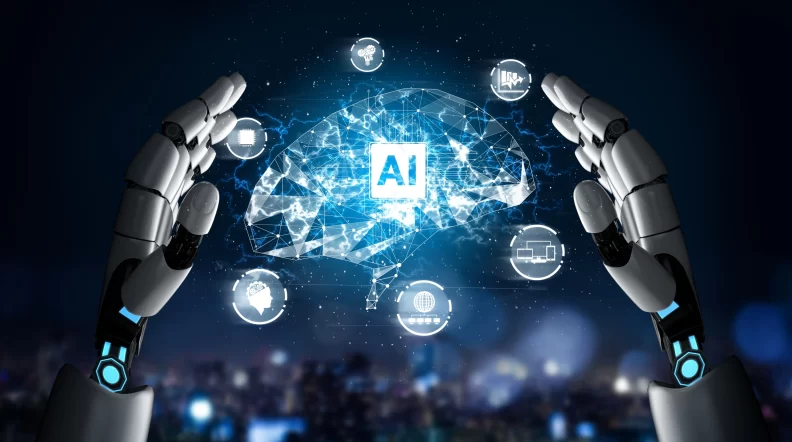Era of AI: Navigating the New Frontier






The advent of artificial intelligence (AI) marks a pivotal shift in the fabric of technological advancement, ushering in an era where machines begin to mirror human intelligence. This new frontier is characterized by the development of AI tools capable of performing tasks that traditionally required human intellect. From analyzing data to understanding natural language and recognizing speech, AI’s capabilities are expanding at an unprecedented rate. The era of AI promises to redefine the boundaries between machines and human intelligence, pushing the limits of what’s possible with computing power.
As we navigate through this era, the integration of AI into various sectors of society signifies a transformative period in human history. The evolution of intelligent machines, driven by advancements in artificial intelligence research, has the potential to revolutionize industries, enhance the efficiency of operations, and address some of the most pressing challenges facing humanity today. The role of AI tools in analyzing video content and automating complex processes showcases the versatile applications of this technology.
However, the journey into the era of AI is not without its challenges. Ethical considerations, the responsible use of AI, and the implications for employment and privacy are critical discussions that accompany the rise of intelligent agents. The balance between leveraging the capabilities of machine intelligence and safeguarding human values is a delicate one, requiring thoughtful deliberation and proactive governance.
The era of AI, therefore, is not merely about the technological marvels it brings but also about the societal shifts it entails. As we stand on the brink of this new era, the collective endeavor of science and industry aims to harness the power of AI responsibly, ensuring that the benefits are widely distributed and the potential risks are effectively managed. The journey ahead is as much about innovation as it is about adaptation, as we learn to coexist with the intelligent machines of the future.
The Advent of Artificial Intelligence
The foundation of artificial intelligence was laid down by the curiosity to replicate human intelligence within machines. This pursuit led to the development of computing power and intelligent agents capable of performing tasks that require the cognitive functions of the human brain. The inception of AI was driven by a desire to understand the principles that make intelligent behavior possible in machines, sparking a wave of artificial intelligence research across the globe.
As the field evolved, AI tools began to exhibit capabilities such as speech recognition, natural language understanding, and computer vision. These tools allowed machines to analyze data and video content, making sense of the world in a way that was previously exclusive to humans. The development of AI has been a journey of unlocking new potentials, where machines not only simulate but also extend human intelligence, opening up possibilities that were once confined to the realm of science fiction.
Understanding the Basics
At its core, artificial intelligence aims to create machines that can mimic human intelligence. This involves developing algorithms and models that enable machines to process information, make decisions, and learn from experiences. The basics of AI involve understanding how to equip machines with the ability to analyze data, recognize patterns, and perform cognitive tasks without explicit human instruction. Central to AI is machine learning, a subset of AI that focuses on the ability of machines to improve their performance based on the data they process.
The concepts of machine intelligence and computing power are fundamental to AI. By harnessing these elements, AI tools can perform complex tasks ranging from speech recognition to computer vision. These capabilities allow AI systems to interact with the world in a way that mimics human perception and decision-making, laying the groundwork for the development of intelligent machines. Understanding these basics is essential for grasping how AI is transforming our world, driving innovations that were once beyond our imagination.
The Evolution of AI Through the Years
The journey of artificial intelligence from its inception to the present day has been marked by significant milestones and breakthroughs. Initially, AI research focused on creating programs that could solve problems and mimic human intelligence in a controlled environment. Over time, the field witnessed the development of intelligent agents capable of learning from data, leading to the creation of machine learning models. These models became the backbone of AI’s ability to understand natural language, recognize images, and make informed decisions.
Throughout its evolution, AI has experienced periods of rapid growth and stagnation, known as AI springs and AI winters. Despite these fluctuations, the relentless pursuit of advancing machine intelligence has led to the emergence of AI tools that are now integral to many aspects of daily life and industry. The evolution of AI is a testament to the human desire to push the boundaries of what machines can do, driven by advancements in computing power and the innovative application of AI technologies.
The Impact of AI on Society and Industry
The impact of artificial intelligence on society and industry is profound, reshaping the way we live, work, and interact with the world around us. By automating routine tasks, enhancing decision-making, and fostering innovation, AI is transforming industries and improving efficiency. Beyond economic benefits, AI also presents opportunities to address complex societal challenges, such as healthcare delivery, environmental conservation, and education. The integration of AI into various sectors underscores its potential to drive progress and enhance the quality of life.
Transforming Industries with AI
Artificial intelligence is revolutionizing industries by enabling the automation of complex tasks, optimizing operations, and fostering product innovation. From manufacturing to healthcare, AI tools are being deployed to improve efficiency, reduce costs, and enhance service delivery. By analyzing vast amounts of data, AI systems can identify patterns and insights that support better decision-making and innovation, leading to the development of new products and services that meet evolving consumer demands.
Sustainable Operations and Product Innovation
The application of AI in industry has led to significant advancements in sustainable operations and product innovation. By leveraging AI tools to analyze data and optimize processes, companies are reducing waste, conserving energy, and minimizing their environmental footprint. This shift toward sustainability is not only beneficial for the planet but also enhances brand reputation and customer loyalty. Moreover, AI-driven innovation is enabling the creation of smarter, more efficient products that cater to the specific needs and preferences of consumers, opening new avenues for growth and competitiveness.
In the realm of product development, AI is playing a crucial role in accelerating the design process, improving the functionality of products, and enhancing user experiences. Through the analysis of consumer data and feedback, AI systems can inform the development of products that better align with market trends and consumer expectations. This data-driven approach to innovation is transforming product design, enabling companies to stay ahead in a rapidly evolving marketplace.
Ethical Considerations and the Responsible Use of AI
As AI becomes more integrated into society, ethical considerations and the responsible use of AI have come to the forefront. The potential for AI to impact employment, privacy, and security raises important questions about how these technologies should be developed and deployed. Ensuring that AI is used in a way that benefits society and minimizes harm requires careful consideration of ethical principles, transparency, and accountability. Addressing these concerns is essential for building trust in AI technologies and ensuring their positive contribution to society.
Rights, Permissions, and the Role of Governance
The governance of AI involves establishing frameworks and policies that guide the development and use of AI technologies in a manner that respects rights and permissions. As AI systems become more capable and widespread, the role of governance in ensuring ethical standards, data protection, and privacy becomes increasingly important. Regulatory bodies and organizations are tasked with creating guidelines that balance innovation with the protection of individual rights, ensuring that AI is developed and used responsibly.
In addition to legal and regulatory measures, the role of governance in AI extends to promoting best practices among developers and users. This includes encouraging transparency in AI algorithms, fostering public understanding of AI technologies, and ensuring that the benefits of AI are accessible to all segments of society. By prioritizing ethical considerations and responsible use, governance plays a key role in shaping the future of AI, ensuring that it serves the common good.
Exploring the Future of AI
The future of AI holds immense possibilities, shaped by ongoing advancements in computer science and the dedication of cognitive scientists. As we enter the AI era, the development of generative AI and artificial neural networks is poised to further expand the capabilities of AI systems. These technologies promise to enhance the ability of AI to generate creative content, understand complex patterns, and interact with users in more natural and intuitive ways. The potential for AI to transform industries, improve daily life, and address global challenges is greater than ever.
However, the path forward is not without obstacles. The history of AI includes periods of intense enthusiasm followed by disappointment, known as AI winters, when expectations did not meet reality. Learning from these cycles, the focus is now on sustainable progress, grounded in rigorous computer science research and responsible deployment. The public release of AI technologies is approached with caution, ensuring that advancements are both ethical and beneficial. The future of AI, therefore, is not just about technological breakthroughs but also about navigating the complex landscape of societal impact and ethical considerations.
The Next Wave: Predictions and Possibilities
The next wave of AI is expected to handle massive amounts of data more efficiently, enabling breakthroughs in various fields such as healthcare, environmental science, and autonomous vehicles. These advances will not only improve the accuracy of predictions and decision-making but also open up new possibilities for innovation and problem-solving. The ability of AI systems to process and analyze massive amounts of data in real-time will significantly enhance their utility, making them indispensable tools for addressing some of the world’s most pressing issues.
As AI technologies continue to evolve, they will become increasingly integrated into everyday life, transforming the way we interact with the world around us. From personal assistants that understand our preferences to intelligent systems that optimize energy use in homes and businesses, the potential applications of AI are vast. The next wave of AI promises to bring about a future where technology and human life are more seamlessly interconnected, offering unprecedented opportunities for growth and improvement.
Preparing for the Challenges Ahead
The integration of AI into society has enabled the development of innovative solutions to complex problems, but it also presents new challenges. Balancing the benefits of AI with ethical considerations, ensuring data privacy, and mitigating the risk of job displacement are among the biggest problems facing the field. The collaboration between science and society is crucial in addressing these challenges, leveraging the power of data science and machine learning techniques to benefit people’s lives while safeguarding individual rights and freedoms.
As we move forward, the lessons learned from science fiction, historical attempts at creating machines with intelligence, and the mythological tales of intelligent beings, like those from the island of Crete with its sacred statues, inform our approach to AI development. The 21st century marks a significant phase in the AI revolution, characterized by the rapid advancement of machine learning models, the growing importance of training data, and the increasing computing power available through cloud services. Preparing for the challenges ahead involves not only technical advancements but also a comprehensive understanding of the societal impact of AI, ensuring that the AI revolution benefits all of humanity.